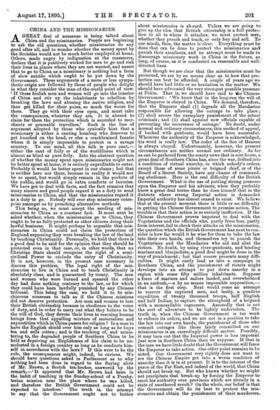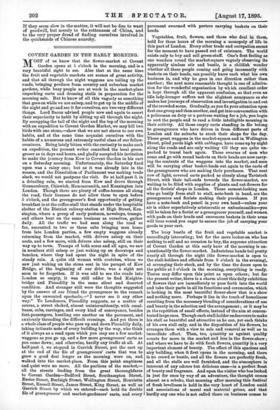CHINA AND THE MISSIONARIES.
AGREAT deal of nonsense is being talked about China and the missionaries. People are beginning to ask the old questions, whether missionaries do any good after all, and to wonder whether the money spent by the Societies would not be much better employed at home. Others, made angry by indignation at the massacres, declare that it is positively wicked for men to go and risk their lives in places where they are not wanted, and assert that to go to China as a missionary is nothing but a form of slow suicide which ought to be put down by the Government. These arguments of a more or less sympa- thetic origin are followed by those of people who delight in what they consider the man-of-the-world point of view. If these foolish men and women will go into the interior of China and stir up the inhabitants to rebellion by breaking the laws and abusing the native religion, and then get killed for their pains, so much the worse for them. They go with their eyes open, and must take the consequences, whatever they are. It is absurd to claim for them the protection which is accorded to mer- chants or peaceable travellers.' Such is the line of argument adopted by those who cynically hint that a missionary is either a canting humbug who deserves to get knocked on the head, or else a crackbrained fanatic whom it is simply impossible to protect in a savage country. To our mind, all this talk is pure cant,— either the cant of folly or of the worldliness which is almost as blind as pure folly. Into the abstract question of whether the money spent upon missionaries might not be better spent at home, it is entirely unprofitable to enter. Probably it would be better spent in our slums ; but that is neither here nor there, because in reality it would not be so spent, but would simply remain in the pockets of the public, and would go in extra comforts or luxuries. We have got to deal with facts, and the fact remains that many sincere and good people regard it as a duty to send missionaries to China, and that the missionaries regard it as a duty to go. Nobody will ever stop missionary enter- prise amongst us by preaching alternative methods.
This being so, we must accept the sending of mis- sionaries to China as a constant fact. It must next be asked whether, when the missionaries go to China, they ought to be as fully protected as other citizens doing their lawful business. It might perhaps be arguable that mis- sionaries in China could not claim the protection of England supposing they were breaking the law of the land by teaching Christianity. Personally, we hold that there is a good deal to be said for the opinion that they should be protected even in that case, or, in other words, that no Christian State should recognise the right of a semi- civilised Power to exclude the entry of Christianity. It is not, however, in the present case necessary to discuss this problem. The legal right of the mis- sionaries to live in China and to teach Christianity is absolutely clear, and is guaranteed by treaty. The men and women who were burned and speared the other day had done nothing contrary to the law, or for which they could have been lawfully punished by any Chinese tribunal. This being the case, we hold it to be mis- chievous nonsense to talk as if the Chinese missions did not deserve protection. Are men and women to lose their British citizenship because in obedience to the voice of duty, and in order to carry out what they believe to be the will of God, they devote their lives to rescuing human beings from that appalling mixture of materialism and superstition which in China passes for religion ? Is a man to have the English shield over him only as lung as he buys tea and sells cotton ; and is the teaching of, and minis- tering to, the degraded people of Southern China to be held as depriving an Englishman of his claim to be un- molested in a foreign country as long as he conducts him- self in accordance with the laws ? If this were to be the rule, the consequences might, indeed, be curious. We should have questions asked in Parliament as to why nothing had been done in regard to the flaying alive of Mr. Brown, a Scotch tea-broker, answered by the remark,' It appeared that Mr. Brown had been in the habit of teaching in the Sunday-school of a Presby- terian mission near the place where he was killed, and therefore the British Government could not be expected to interfere.' The truth is, the attempt to say that the Government ought not to bother about missionaries is ab surd. 'Unless we are going to give up the idea that British citizenship is a full protec- tion to all to whom it attaches, we must protect men,. whether they preach and teach, or only buy and sell. To our minds, then, the matter is clear. Everything must be done that can be done to protect the missionaries and punish their assailants, and no attempt must be made to discourage missionary work in China in the future, so long, of course, as it is conducted on reasonable and well: directed lines.
But though we are clear that the missionaries must be protected, we are by no means clear as to how that pro- tection can best be afforded. A couple of years ago we should have had little or no hesitation in the matter. We should have advocated the very strongest possible pressure at Pekin. That is, we should have said to the Chinese Government : We know that in the long-run the will of. the Emperor is obeyed in China. We demand, therefore,. that the Emperor shall (1) degrade all the Mandarins responsible for allowing the outrage to take plate ; (2) shall secure the exemplary punishment of the actual criminals ; and (3) shall appoint new officials capable of preventing the recurrence of outrage.' No doubt, under normal and ordinary circumstances, this method of appeal, if backed with gunboats, would have been successful. Wherever the authority of the Emperor is acknowledged, his word is really law. The order of the Son of Heaven is always obeyed. Unfortunately, however, the present circumstances are neither normal nor ordinary. As far as can be gathered from the scanty news that is sent home, a great deal of Southern China has, since the war, drifted into a condition of virtual anarchy, in which nobody's orders, except those of some pirate or brigand chief, or of the Board of a Secret Society, have any chance of command- ing obedience. Here is the real difficulty of the British Government. What is the use of putting strong pressure upon the Emperor and his advisers, when they probably know a great deal better than he does himself that in the- districts where strong Imperial action is demanded Imperial authority has almost ceased to exist. We believe • that at the present moment there is little or no difficulty in getting the Chinese Government to promise action. The trouble is that their action is so entirely ineffective. If the. Chinese Government proves impotent to deal with the Vegetarians and the officials who, partly from fear, partly.. from interest, fail to check their attacks on the missionaries, , the question which the British Government has next to con- sider is how far would it be wise for them to take the law into their own hands, and themselves try to punish the Vegetarians and the Mandarins who aid and abet the rioters. No doubt, by using river-gunboats, and landing- marines and bluejackets, a good deal might be done in the way of punishment ; but that course presents many diffi- culties. It might easily lead us into a campaign in Southern China, and the punishment of rioters might develope into an attempt to put down anarchy in a region with some fifty million inhabitants. Suppose- a force of marines and sailors landed, and overwhelmed in an ambush,—a by no means impossible supposition,— that is the first step. Next would come an attempt to recover the captured men, and lastly, a punitive expedition of twenty thousand troops, half English and half Indian, to capture the stronghold of a brigand with a monosyllabic cognomen. Assuredly that is not the sort of adventure to be lightly undertaken. The- truth is, when the Chinese Government is too weak to enforce its orders, and we are not in a position to take the law into our own hands, the punishment of those who. commit outrages like those lately committed onour missionaries is an exceedingly difficult matter. Possibly,. it may turn out that the Imperial power is less impotent just now in Southern China than we suppose. If that is the case we have little doubt that the Government will force the Emperor to take action. One other point remains to be noted. Our Government very rightly does not want to see the Chinese Empire get into a worse condition of anarchy than it is in at present. It is to the interest of the peace of the Far East, and indeed of the world, that China should not break up. But who knows whether we might not precipitate that break-up by forcing the Emperor to exert his authority over provinces which are already in a state of smothered revolt ? On the whole, our belief is that the Government will do its best to protect the mis- sionaries and obtain the punishment of their murderers-
If they seem slow in the matter, it will not be due to want of goodwill, but merely to the rottenness of China, and to the very proper dread of finding ourselves involved in the quicksands of Chinese anarchy.



































 Previous page
Previous page